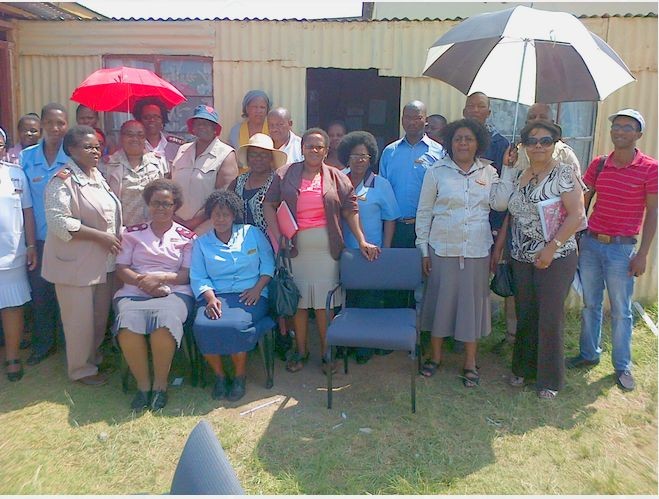
Staff with community health workers at Tsolo Community Health Clinic in the Eastern Cape.
2 December 2016
Tens of thousands of community care workers who care for the frail, poor, and those who are ill and disabled are to be excluded from the proposed minimum wage.
According to the report tabled at NEDLAC, the proposed minimum wage of R3,500 a month is not likely to apply to volunteers who receive a stipend, including community care workers.
These workers remain largely unseen and the crucial work they do, sometimes on behalf of government, is largely unappreciated.
Nontutuzelo Hlafa, the Chairperson of the Interim National Committee of Community Care Workers, has been working as a community care worker for 18 years.
“In all this time,” she says, “my work has not been recognised as work by government. This means that I do not have access to any worker benefits and protection, and I do not receive a regular decent wage. The work I do benefits this country, yet my efforts are not acknowledged. Many community care workers have suffered and died as a result of the lack of support and protection in the workplace.”
At a recent meeting of more than 100 community care workers in the Western Cape organised by the Wellness Foundation, one of the workers, Ma Anna Genu, warned: “Government needs to understand that they are causing more destruction in this sector by not recognising care work and financing and supporting community care workers. If it were not for the commitment of care workers, this service would long have died. Our frustrations are growing and a serious uprising needs to be avoided. Care workers need to live as well as provide this service. Government must recognise and support them.”
Clearly, this group of mostly women has had enough. They are care workers, no longer just care givers (a title which unfairly perpetuated the notion that care is not work).
Attempts by the government to exclude them, to ask them to wait are just plain immoral. These workers have debunked the myth that care workers are not workers, any more than those who do not pay PAYE or corporate tax are not taxpayers. These women provide essential services where they are most needed.
They typically work in environments that are densely populated, under-resourced, and crime-ridden, where they are exposed to physical violence and bodily harm. The stipends they receive typically do not meet their basic needs, and they work with families which do not have much either, often taking food from their own homes to give to their patients.
All this stress affects their emotional, physical and mental health, leading to problems like the lack of commitment to work, absenteeism, lack of motivation and low morale which affect their work. Emotions that accompany this state are hopelessness, high levels of self-guilt, depression, feelings of inadequacy and worthlessness.
It is wrong to suggest that if community care workers’ remuneration is regulated the sector will collapse. On the contrary: if government does not recognise the work done by community care workers and continues to place this burden of care on civil society, the sector will indeed collapse. There is an urgent need to address this inequality and injustice this country’s government has been sweeping under the carpet for too long. Care work must be regulated and remunerated fairly, by government.
There are many funding options, including revising the division of revenue and allocation of conditional grants and equitable shares to adjust for rurality and community care work. Incentives could be provided for innovative and cost saving practices in government, freeing money to pay for community care workers.
The NEDLAC Report notes that more than 36% of workers in “community, social and personal services earned below R3,500 per month in 2014” and that “workers in this segment of the economy form the largest share of workers who earn below R3,500 (19.2%).”
We strongly oppose the suggestion that minimum wages for this “underfunded” sector may have negative employment effects. Bluntly put, such thinking appears to be based on trickle-down theory and a neo-liberal economic approach to our national crisis. There is an urgent need to find resources by questioning assumptions that no more taxation funding can be found. We need a radical approach.
For one thing, the “fruitless and wasteful expenditure” by the state, alone, could have paid a minimum wage to the 42,000 Community Health Workers for almost a year.
Views expressed are not necessarily GroundUp’s.